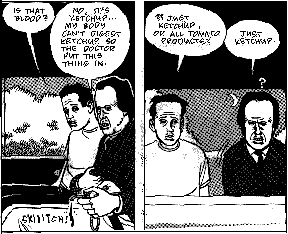
Dan Clowes: He-Man Comic Artist

His Art
m: So, let's talk a little bit about how you develop ideas and all of
that. Um, where do you come up with these things [laughs]?
Where do you come up with some of these characters and ideas
for different pieces you have here?
d: . . . I mean, everybody, everyday has brilliant ideas that would
make great stories, but they don't see it in any context. They
just have these random thoughts that don't correlate into
anything else; they don't figure out a system to apply it to.
Whereas I'm really aware of all my thoughts, and I now know
instantly when I have an idea if this is a good idea worth
pursuing that has many interesting avenues and possibilities, or
if it's just some stupid thought I had while in the bathtub or
something. Sometimes it's hard to tell the difference.
m: So you get a great idea, say, and you know that it's a great idea,
and you actually start spending a lot of time working on it. Do
you ever lose the original flavor and wonder, wow, is this really
a good idea or not?
d: That's certainly a danger and I try not to do that. Once I get a
great idea I just write it in my sketch book and then I just try to
not even think about it. And if it comes into my head, that's
fine, but I try not to make myself agonize over it. And then I
usually look at it a month or two later and just sit down and
write a story out based on it; and if it comes out good, then I
might pursue it, and if it doesn't, I might just throw it away or
look at it again in another month or so.
m: So it would be kind of a three-fold process. I mean the idea
comes, and then you go through the sketching of it, and after
that you actually sit down and ink the thing.
d: Yeah, and I try to make it so that I'm never sort of copying one
of the steps, and each step is sort of a leap from the previous
step. I try to never have endings and weird plot twists in mind.
I try to just let that all come naturally.
m: You said before that when you
were drawing, it wasn't so much an escape for you as a way of
confronting anxieties or playing them out. Is it still that way for
you?
d: Oh, absolutely. Now I'm more aware of it. At the time I was just
doing stories that I thought were interesting, and now, looking
back, they're just filled with symbolism of my angst over certain
things. But now it's sort of on a more conscious level that I'm
dealing with all this stuff. Though, I still draw a lot of stuff that
I know, for some reason, is very interesting to me or has some
real emotional content to me that I'm very interested in drawing
it but haven't really figured out why. Sometimes after it's
printed I can look at it and try to analyze why this is so
important to me.
m: Oh, OK. That was going to be my next question: Do you go back
and look at these things. I mean, especially with something like
The Velvet Glove which is really. . .
d: Oh, it's filled with it.
m: Yeah, it's really surreal using a lot of imagery [laughs] -- that
was a terrible explanation. But, you know, it's got this kind of
hypnogogic feel and it's something you could see coming out on
Freud's couch or something.
d: Yeah, yeah certainly. I mean, I try not too read to much of my
old work because it tends to depress me. I just look at the
artwork and I see all the flaws in it and that kind of thing really
bothers me. Yeah, whenever I do sit down and read it I'm
always shocked at all the Freudian stuff [laughs].








